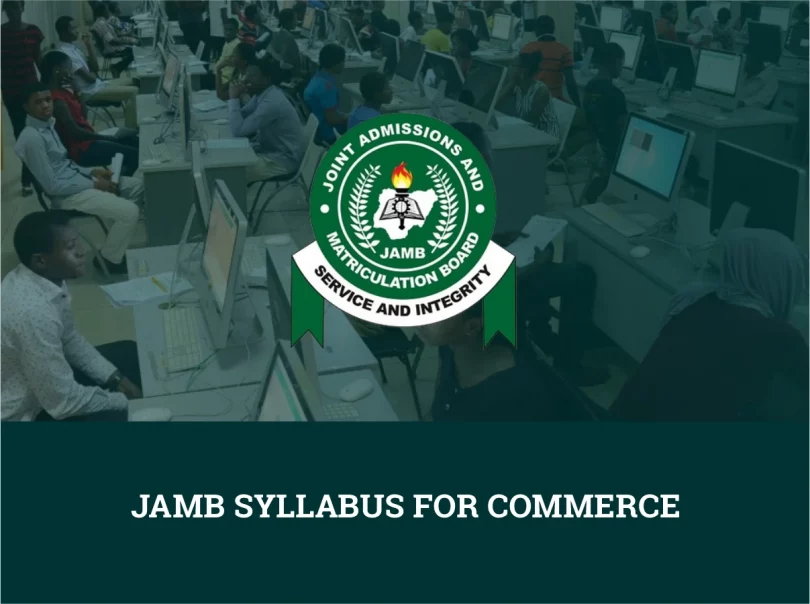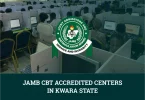If you are aiming to pursue a degree in fields like Economics, Accounting, Business Administration, or Marketing in Nigeria, understanding the JAMB Commerce syllabus is crucial. If you are going to write Commerce in the 2026/2027 JAMB, it is important to know and understand the JAMB syllabus for commerce, as the syllabus outlines the key topics and objectives that will guide your preparation for the UTME.
Commerce involves the activities related to the exchange of goods and services, including trade and the various services that facilitate trade. It is a fundamental aspect of any economy, driving growth and development. Studying Commerce helps you understand how businesses operate, manage resources, contribute to economic development, and respond to government policies.
The JAMB syllabus for Commerce is designed to help students understand basic ideas and terms used in commerce, how commerce connects with other subjects, and everyday life, use what they learn in real-world Nigerian businesses and situations, and keep up with changes and improvements in commercial activities. This article will show you all you need to know about the JAMB syllabus for commerce and how to prepare effectively to succeed.
JAMB Syllabus for Commerce
Here are the topics students need to understand in the JAMB syllabus for commerce to excel in the 2026/2027 UTME exams:
What is Commerce?
- Learn what Commerce is and what it includes.
- Understand its features and roles.
- Know the difference between Commerce and related subjects like Economics and Accounting.
Occupation (Jobs and Careers):
- Understand what an occupation is and why it matters.
- Learn the types of work: industrial (factories), commercial (business), and services (teaching, healthcare, etc.).
- Know what affects people’s career choices.
Production:
- Learn about the factors of production: land, labor, capital, and entrepreneurship, and what rewards they bring (like rent, wages, profit).
- Understand division of labor and specialization.
- Identify types of production: primary (farming), secondary (manufacturing), tertiary (services).
Trade:
Home Trade: Learn about selling goods within Nigeria through:
- Retailers: who sell to final consumers (types, advantages/disadvantages).
- Wholesalers: who buy in bulk and sell to retailers.
Foreign Trade: Learn about trading with other countries, including:
- Key terms (balance of trade, countertrade).
- Documents used in importing/exporting.
- Barriers like tariffs.
- Government bodies like Customs.
Buying and Selling Goods:
- Learn the steps and paperwork involved in buying/selling (invoice, receipt, bill of lading).
- Understand trade terms like discounts and delivery types.
- Learn the difference between paying with cash and credit, and their pros and cons.
Support Services for Trade (Aids-to-Trade):
- Advertising: Media types, pros/cons.
- Banking: Types of banks, services they offer, and problems they face.
- Communication: How messages are passed, tools used, and challenges.
- Insurance: Types, key principles, terms, and benefits.
- Tourism: Importance, government agencies, and challenges.
- Transportation: Different ways goods and people move, and their pros/cons.
- Warehousing: Importance, types, and how to choose where to build a warehouse.
Types of Businesses:
- Learn about different kinds of businesses (sole trader, partnership, company, cooperative, public corporation).
- Know how to register a business, merge companies, and what causes closure.
- Understand the benefits and drawbacks of each type.
Funding a Business:
- Know where businesses get money from (savings, loans, investors).
- Understand types of capital (e.g, working capital, authorized capital).
- Learn to calculate profits and turnover.
- Know the challenges businesses face in getting funds.
- Understand the role of currency exchange services (Bureau de Change).
Trade Groups:
- Understand the role of trade and producer associations (e.,g. Poultry Farmers’ Union).
- Learn the functions of the Chambers of Commerce.
Money:
- Learn about the history and development of money.
- Understand its types, features, and uses.
The Stock Exchange:
- What the stock exchange does and why it’s important.
- Learn about securities like stocks, bonds, and debentures.
- Understand how buying and selling work.
- Know about the Second-Tier Securities Market and its benefits.
Business Management Basics:
- Understand what managers do: plan, organize, staff, lead, and control.
- Learn key principles like the chain of command and delegation.
- Learn about different company structures (line, matrix, etc.).
- Know the main business areas: production, finance, marketing, HR.
- Understand the resources businesses use (money, people, materials).
Marketing:
- Learn the role and importance of marketing.
- Understand the marketing mix: product, price, place, promotion.
- Understand customer focus and market segmentation.
- Learn about customer service and public relations.
Business and the Law:
- Understand contracts, how they work, and when they’re valid.
- Learn laws like the Sales of Goods Act, Hire Purchase, and employment rights.
- Know about business protections like trademarks, copyrights, and patents.
- Learn how agencies protect consumers (e.g., NAFDAC, NDLEA, SON).
Information and Communication Technology (ICT):
- Learn the role of computers in business.
- Understand computer types and what they do.
- Know terms like Internet, browsing, e-mail, etc.
- Learn about online business activities (e-banking, e-commerce).
- Understand the benefits and challenges of ICT.
Business and Society:
- Understand how law, politics, economy, and culture affect business.
- Learn about social responsibilities like product safety and charity.
- Know the effects of pollution (air, land, water) on business and the environment.
Recommended Commerce Textbooks (WAEC Syllabus)
Here is the list of the JAMB recommended textbooks for commerce:
- Anderson, D. J. (1978). Commerce for West Africa – Macmillan, London.
- Ahukannah, L. I. et al (1992), Commerce for Secondary Schools – Africana-FEP Publishers, Onitsha.
- Asaolu, A. & Igwe, P. M. (2005), New Syllabus Commerce for Secondary Schools Books 1–3 (2nd Edition) – Evans, Ibadan.
- Babatunde, A. H. (1999), Handbook on Commerce for Schools and Colleges – Global Publications.
- Eriki, P. O. (1998), Working with Computers – Bofic Publishers, Benin.
- French, C. S. (2000), Computer Science (5th Edition) – Ashford, Britain.
- Ibru, G. M. (2004), Nigeria: The Promise of Tourism – G.S.L. Publishing, Lagos.
- Igwe, P. M. et al (2004), Countdown to WASSCE/SSCE/NECO/JME Commerce – Evans, Ibadan.
- James, A. F. et al (1996), Management (6th Edition) – Prentice Hall, New Delhi
- Nwachukwu, C. C. (1999), Management Theory and Practice – Africana-FEP Publishers, Onitsha.
- Odedokun, M. O. et al (1999), Commerce for Senior Secondary Schools, Books 1–3 – Longman, Lagos.
- Odoom, F. F. (1998), Commerce for Senior Secondary Schools Books 1–3 – Onibonoje, Ibadan.
- Onifade, A. (2001), Management: Office Business Education – KAPPCO, Abeokuta.
- Onifade, A. (2002), The Computer for Word Processing and Internet – KAPPCO, Abeokuta.
- Onu, A. J. C. (2000), Marketing Today – Precious Treasures Ltd, Abuja.
- Pallister, J. & Isaacs, A. (Eds.) (2002), A Dictionary of Business (3rd Edition) – Oxford University Press.
- Ubaka, O. A. (2012), Commerce Simplified for SSS 1–3, WAEC, NECO, JAMB & NABTEB Exams – Andyson Millennium Concepts, Abuja.
Tips to Pass the JAMB
To use this syllabus effectively and excel in your JAMB, you need to focus on understanding concepts rather than rote memorization and use past questions to familiarize yourself with the exam format. Be aware of current trends and developments in commerce. By following the information provided and aligning your study efforts with this syllabus, you will be well-prepared to tackle the JAMB Commerce exam and pursue your desired course of study.







Leave a Comment